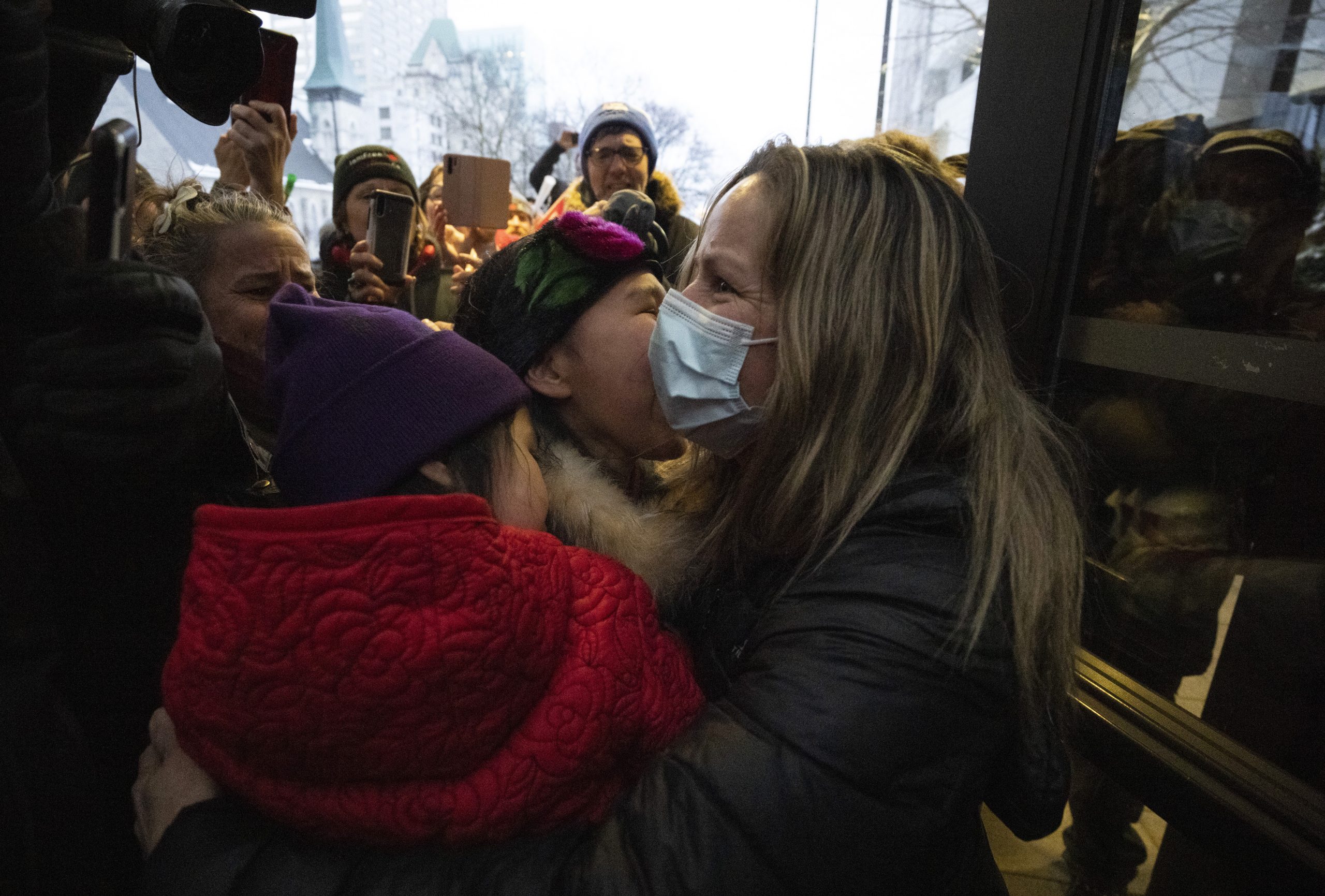Canada News
‘Freedom Convoy’ organizer Tamara Lich denied bail, ordered detained until trial

Tamara Lich, an organizer “Freedom Convoy” embraces supporters as she leaves the courthouse in Ottawa after being granted bail, on Monday, March 7, 2022. THE CANADIAN PRESS/Justin Tang
OTTAWA — “Freedom Convoy” organizer Tamara Lich was denied bail and will remain in custody after a justice of the peace ruled she breached a condition of her original release.
Lich is facing multiple charges of mischief and obstructing police for her role in the massive protest that gridlocked downtown Ottawa for more than three weeks last winter.
She is now facing an additional charge of breaching a bail condition after sitting with fellow protest leader Tom Marazzo at an awards gala in Toronto last month.
Lich’s original bail ordered her to have no contact with several other protest leaders, including Marazzo, unless through her lawyer or while in the presence of her lawyer.
Police sought a Canada-wide arrest warrant for Lich for the alleged breach of her conditions and she was arrested last week in Medicine Hat, Alta., where she lives.
The onus was on Lich to prove appearing with Marazzo at the Toronto event did not breach the no-contact order. Justice of the Peace Paul Harris said Friday that Lich did not prove that.
He has ordered her to remain in jail pending her trial, with her next court date set for July 14.
Her lawyer, Lawrence Greenspon, said outside the courthouse he will bring an application for a bail review to the Ontario Superior Court.
He said she is “understandably disappointed” with the result and eager to regain her freedom.
Greenspon had argued Lich didn’t violate the bail condition because her lawyers were present at the gala where she was seen with Marazzo.
“It is absolutely ridiculous to think the intention of the court-ordered condition not to communicate could be superseded simply by a lawyer’s presence,” Harris said, who also noted Lich’s lawyers provided no evidence to show counsel was present.
Lich accepted an award at the event for organizing the convoy protest against COVID-19 restrictions and the federal Liberal government.
Greenspon also said Lich and Marazzo only had a brief interaction, which lasted “less than three seconds.”
While Harris noted that Lich was given permission to attend the award ceremony, that permission did not envision her sitting at a table with Marazzo and posing for a photo with him afterward. He called her actions and attendance “problematic.”
“Such actions most certainly erode public confidence in the administration of justice,” he said.
In his May ruling that Lich could remain out on bail, Ontario Superior Court Justice Kevin Phillips said he did not accept that Lich breached her release conditions by agreeing to receive an award, and added Lich could be trusted to respect the conditions of her release.
Those terms were intended to prevent a similar protest from happening in the national capital, said Phillips, who noted the protest is over and has left Ottawa, and it would be “practically impossible” to mount a similar protest in the city again.
Both Lich and Marazzo were key spokespeople of the winter convoy protest. Marazzo is also a leader of a group calling itself Veterans 4 Freedom, which staged several rallies in Ottawa over the Canada Day weekend.
Although the convoy has ended, “freedom protests” continue in the capital and likely in other parts of the country, Harris said.
Harris pointed to text messages between Lich and Barber that indicate she may have been a leader and was a recognized decision-maker.
“Command Center just called. Can you head over there with me soon,” Lich wrote to Barber on Jan. 30.
“They have a strategy to gridlock the city. I don’t want to make those decisions on my own,” she wrote.
The messages were obtained by Ottawa police and the Crown entered them as evidence in Lich’s bail hearing this week.
Supporters gathered outside the courthouse Friday waving Canadian flags. Several of Lich’s supporters were also in the courtroom as the decision was read, with one woman openly weeping as the bail was denied.
This report by The Canadian Press was first published July 8, 2022.
———
This story was produced with the financial assistance of the Meta and Canadian Press News Fellowship.
Erika Ibrahim, The Canadian Press





















